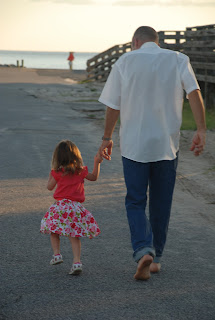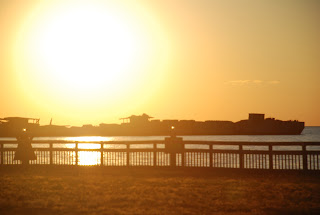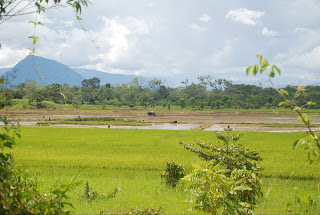Over the weekend, my host family visited their
home-town, Calzada, for lunch. Near the plaza (as in all Spanish settlements)
stands the Catholic church. In the background the famous Morro de Calzada is
seen—one can hike up this touristic attraction.
Francis, my host family, their granddaughter,
grandmother, and daughter, Janet, with her baby boy.
…and their ruso-americana daughter.
Luana, a granddaughter of my host family, started to
talk just as I arrived in the family and mastered my name quickly (likely because
she loves grapes, ‘uvas’--Luba).
Wrapping up…or rather packing up:
Wondering
how to best conclude my internship postings, I decided to revisit my prior
postings, journal entries, and notes from books that I have read to provide an
overview of my journey during the past four months. From a few recurring
topics, I have chosen to describe how I have gone about experiencing community
and defining medical missions/health development (neither of which started or
will end within the duration of my internship). Reflecting overall, I conclude
by sharing my anticipations for the immediate future. It has been a pleasure to
thus contemplate my time in Latin America and I am hopeful that sharing in my
expedition has been a constructive experience for you.
The church hosted a picnic to raise money for a radio
station. One chef prepared ‘una entrada de sandia,’ a watermelon entre with
beet-colored mashed potatoes and avocado.
One church member readies to enjoy her ‘causa rellena,’
a stuffed mashed potato roll.
A layered Jello cake is sold.
In the evening, I settled on my mosquito net-covered
bed to prepare an overview of my four months in Latin America.
Experiencing
community:
Upon beginning my internship, my concept of community
with clinicians and my host families was functionally based. I thought I was
going to do volunteer work and would for this reason find a space of acceptance
and appreciation amongst the surrounding people. I found this to be somewhat
true during the first week or two, when I was introduced as "the gringa
dental student from the US, volunteering at the clinic for two months." However,
when the daily and weekly tasks of my service were no longer novel and I had
been introduced to many, it seemed necessary to go beyond my role and function
as a volunteer to belong or be amidst for an extended period of time. Finding
that my pale skin and blue eyes would prompt any passerby to reaffirm the
racial boundaries that seemingly kept me from connecting with my surroundings,
I found it useful to observe, during a church worship song, how identical our
basic human needs were, those of relationship (to a self, a higher being, and
each other) regardless of ethnicity. On this basis, as well as becoming a
recorder teacher, I found it easier to interact and connect with locals such
that when weekly brigades from the States came, I felt more at ease alongside the
locals. Passing through Argentina in my transition from Honduras to Peru, I
reconsidered what it means to be an immigrant and to belong to a culture in a
sectored heterogeneous society (mixed salad not melting pot). Trying to frame
myself within a specific race, socio-economic status, and set of beliefs seemed
unnaturally forceful to me. Rejecting one cultural heritage for another felt
too reductive to define my complexly integrated legacy. Despite my inability
(or unwillingness) to identify with a social group or culture, in each location
that I visited, I was comforted by and grateful for the undemanding and
unconditional membership within a host family. Here, the basic stability of
home life was provided, no matter what
social interactions went on (or lacked) outside of the house. Even so, I felt
the difference between being a host daughter and recalling what it means to be
a daughter. Experiencing a variety of worship styles, my idea of fellowship has
also diversified. Consistent reminders of cultural and racial differences have
persisted and leave me suggesting that serving one's neighbor need not take
place abroad and may be more effectively done at home. Nonetheless, my
resistance to upholding clear cultural boundaries insists, with the observation
that supporting these divides usually involves hints of mutual exclusivity and
condescension or even contempt or disdain for the 'outie.' I find disparagement
of lower classes especially tragic; how can anyone who has any ounce of human
warmth be so cold and ignorant towards people who have so much need or poverty
(relational and material)?...Perhaps this is our own poverty...and we don't
even know it--in fact we think we are rich and have no want. But we know not
that we are poor, blind, and naked, needing to receive an offered remedy if we
would only acknowledge our need for it. During the past four months, I have
passively and actively interacted with many diverse people. I have enjoyed
experiencing a connective resonance while working in a team whose members share
similar passions and motivations; I hope to be fortunate to belong to many such
groups in my future as a health care professional. My practical definition of
community has shifted from function, an outward motion of doing, to existence,
a receiving motion of being. I hope the relational connections that I have
formed remain in my memory as an important part of my experience and that I
continue interacting within a diverse community as I return to the States. I
will conclude my overview of experiencing community with a quote from one of my
journal entries: "What did I do for four months, after all? Most simply
and truly said, I lived and existed in a different place where people live and
exist just as anywhere else."

The entrance to the clinic.
The San Lucas Association crew.
Giving several more talks about oral infection and
hygiene in schools.
…and my hands after twelve such ‘chalk talks.’
To schools in the city, my tooth model accompanied me.
Defining
medical missions/health development:
A few of the foremost of my intentions in seeking an
opportunity to intern with dental/medical missions in Latin America were to
learn how medicine blends with missions, how (dental) health care needs were
addressed in other countries, and how any one specific health organization
functions. Underlying these conceptual goals, I simply wanted to lend my hands
to improve health; that is, I wanted to do something to resolve the health
needs I assumed would exist. Thus, my initial definition of medical missions
emphasized works, echoing and emulating the evangelical phrase, "what
would Jesus do?" Seeing the incompleteness of a treatment for individuals
with many ailments, I still consoled myself that 'truth' or 'good' was worth
doing in any amount or to any extent. Noticing the seemingly futile cycles of
medical care (involving treatment of symptoms and recurrent ailment) and the
insufficiency of mass material donations in alleviating material poverty, I
began to wonder about appropriate relative placing of clinicians to the roles
of public/community health workers in addressing problems of poverty and
disease. Participating in several brigades, I sought to gauge the effectiveness
and differentiate between techniques of health projects emphasizing either
treatment or education, one of which often targets symptoms while the other
questions root causes of disease. Observing nutritional industrialization in
villages (manifesting itself through wrapper-polluted roads/streams and
oral/bodily health problems) I hoped that those working for both ecological and
physical health improvement would turn their attention to the origin and
progression instead of the manifestation of ecological and physical disorders.
Working with the community health development director in Peru's San Lucas
clinic, I was taken by surprise during my first week in a village; I was
expecting to do something for the village's health development, but it seemed
that the only things we were doing included talking, eating rice, and waiting
for the rain to pause. The sustainable community-initiated development that we
were encouraging, to me, was a new form of "doing" missions or health
development. The lack of doing things suggested that being a part of a
community's development is more effective in the long run. In the two months
that I have worked alongside these Peruvian development projects, I feel as if
I have only gotten a glimpse of the arduous and lengthy process that lasting
development entails, involving educating, motivating, guiding, and repeating
these steps indefinitely, until the community is empowered to identify and meet
its own needs. The clinic's cleft lip/palate program caused me to question my
initial inference about 'good' or 'truth' being justified in itself. The complex
preparation before and extensive (speech, psychological, etc) therapy after the
surgery diminished the value of a brigade-based plastic restoration on its own.
It seems that financial/medical resources and the genuine desire to be helpful
must be wisely channeled so that 'good' is not done poorly or incompletely.
Partnering with the city school system and the local dental university in the
San Lucas clinic-initiated oral health project, I have realized that my oral
infection and hygiene workshops/lessons would do little for the children were
it not for the commitment of the university to examine each student's mouth and
offer treatment as well as the classroom initiatives that include oral hygiene
practice as part of the daily rubric. Crossing paths with a Peruvian medical
brigade group that visits remote villages, while I continued participating in
community development efforts, I questioned the effectiveness of
treatment-emphasized health care for regions generally isolated from these
services. Yes, it might be effective to treat diarrhea with a parasiticide, but
is it not more effective (in the long run, that is) to equip the people to
prevent infection through teaching simple methods of boiling water and
adequately disposing of waste? So it would seem; however it appears that the
medical and political spheres have convinced themselves and the affected
populations that self-empowerment is inferior to a box of tablets, making
enduring and sound community development more difficult. In these four months,
I feel that I have only gotten a taste of what sustainable medical missions
and/or health development means. Two themes that have continually emerged
include addressing the root causes of disease instead of its manifestations and
being a part of long lasting development instead of doing what seems most
logical and ideal. These repeated themes seem basic, almost intuitive, but are
also complex. I will quote Wendell Berry to try to illustrate this irony:
"All things are connected; the context of everything is everything
else" (Agriculture from the Roots Up, 2004). Berry calls those seeking to
resolve agricultural problems to look at the local water instead of balance
sheets. Likewise in health development, little progress is made towards
improvement by tallying the number of infections or even handing out chemical
"cures." It is necessary to do something basic (not technologically
or chemically advanced): go study the affected region--all of its complex
interactions of people and place--and fully explore and understand the
progression of events that results in what we call disease. Taking the
"from the roots up" approach, one is well-equipped to work to achieve
lasting health. My hope is to continue learning about and participating in
health development efforts that have shown to promise sustainable effectiveness
to cure (or rather assure continual prevention) of disease.

Visiting the asylum for the last time with Francis, we
entertained the residents with recorder concerts.
Last week, this gentleman told me that he tries to
read but doesn’t usually get too far before things start to ‘float apart.’
This señor cares for the baby just as last week.
Several ladies work at the German exercise table with
puzzles and muscle stimulators.
Some recorder songs put residents into deep thought or
tears, others cause them to clap along.
The asylum nurse, guides residents to her office for
the daily blood-pressure check.
This señor sleeps in the same corner just as last
week.
Francis solicits a smile from a resident.
Daniel helps his mom peel potatoes for lunch.
Mostly sitting, mostly waiting…
After we played all of the songs that I had notes for and there
was still desire to hear more of the recorder, I tried to jot down notes for
songs I knew.
Chicks, chickens, and geese roam the yard of the
asylum.
Francis teaches Daniel a German song/game about a
knight on a horse, falling into the mud.
Daniel is eager to ring the lunch bell.
Integrating and moving forward:
Perhaps because I left wintery Virginia for regions
with two seasons characterized by dryness rather than warmth, I haven't fully
been able to 'mark the passing times' with changes in season (as I have known
them to flow). This has resulted in a perceived paused existence during the
past four months. In a way, it has truly been so, as I have stepped out of my
usual surroundings and routines into a new context. At any rate, life, as I
have come to know it and as it has transformed me in these four months, is
coming to a close. The 'resume button' will soon be activated and I will return
to my home context. It is no use denying that I am not returning as I had left;
neither should I expect to find my home context just as I had left it. I have
become accustomed to hand-washing clothes, taking cold showers, eating rice
daily, and walking as a mode of transportation. I have experienced different
ways of worship, family, and work. I have pondered the varieties of health
work, implicating my career goals as a dental health care professional. No
doubt, I will move forward in accordance with these influences. It is neither
needful nor valuable that I project various aspects of the future, but I hope I
will continue seeking that which is prepared for me, and that I keep from
operating under a flawed vision of my Father's grace and mercy, awaiting and
asking for a rock when He is ready to give me bread...if only I would receive
it. In closing of the 'Latin America internship' chapter of my life, I'll offer
some literary influences from my journey that haven't been mentioned prior.
Excerts from Sir Gibbie, by George MacDonald...
Whatever is capable of aspiring, must be troubled that
it may wake and aspire—then troubled still, that it may hold fast, be itself,
and aspire still. (Ch 10)
For he that loves has, as no one else has. It is the
divine possession. (Ch 22)
When life begins to speculate upon itself, I suspect
it has begun to die. (Ch 23)
...the time for speaking comes rarely, the time for
being never departs. (Ch 48)
...to the true heart every doubt is a door.(Ch 49)
And a quote from Wendell Berry...
Imagination, amply living in a place, brings what we
want and what we have ever closer to being the same. (American Imagination and
the Civil War, 2007)
It must be rice-harvesting time.
Rioja, Moyobamba’s neighboring city is also part of
the river valley.
After roughly 36 hours of travel, starting this afternoon, I will return to my family, home, tea-cup, bike, flute, and the
endless list of objects that, coming together, make up the indescribable
experience of home. I look forward to graduation weekend at EMU, spending time
with family, and revisiting the church in which I grew. Assisting my parents to
renovate and move into their new home and participating in my friend's wedding,
I will settle Richmond in preparation for dental school, where I hope to
continue the journeys of learning and serving alongside that I have begun in
Gracias, Honduras and Moyobamba, Peru. Although I hope our paths will cross
again in another context, I thank you for thus far accompanying me en route.




































































